In reality, they barely got 5 that said anything they could spin and to get even that handful, hundreds of thousands were all first parsed at taxpayer expense, and such targeted harassment kept scientists from doing their jobs while they were forced to comply with loopholes in FOIA law that US Right To Know exploits numerous times per year for financial gain. You and I paid for this nonsense.
They manipulate FOIA law to create an "icy chill" among the science community, because activists portray a FOIA request as presumed guilt, and that can be a death sentence for young scholars lacking tenure. The chilling effect is increased when the inevitable pay-to-publish op-eds are written claiming companies are in a big conspiracy to control science and the academics they target are helping. It's good business, US Right To Know has received nearly $600,000 from just one organic industry trade group (which also promotes anti-vaccine beliefs), and gets generous funding from other corporations that sell alternatives to science, like magic soap and expensive extremist exercise videos.
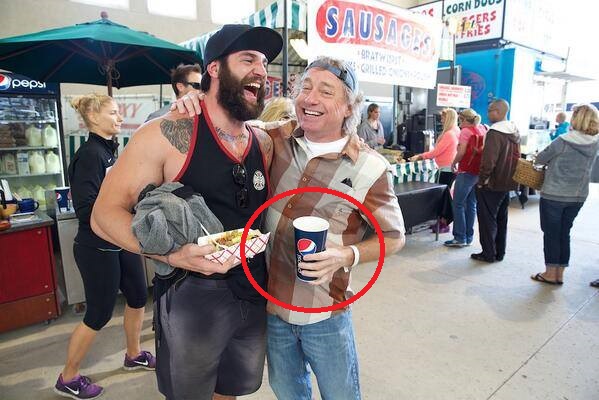
Here is the CEO of one of the corporations that has funded US Right To Know, the group that paid to publish an editorial arguing that Coke might have suppressed results they did not like. That he is holding a Pepsi container is probably just coincidence.
I've never gotten a penny from Coca-Cola, nor has Science 2.0, nor has any organization I've ever been at, at least while I was there, but I know people who have gotten donations from them and when this story broke years ago no one found instances where Coke demanded a deliverable in return for funding. Nor were Ruskin and his team able to find any in their latest attack on health science. Instead, they cherry-picked legal language in 5 out of 87,000 documents that they suggest could have given Coke the ability to suppress results. Then they demand Coke publish the results the company never suppressed in the first place.
It is classic denier for hire framing. It is just not serious scholarship.
Does every paper deserve to be published?
There have been times when I have written freelance articles for newspapers and then bigger news happened and they got delayed and then the timeliness was gone. I got paid for them but they never got published.
Lots of studies also compile data and never result in publication. While scientists can console themselves with 'what we don't find can be important too', journals know null results are not popular and so they rarely get published. Years ago I even offered to create a null results journal, where experiments that failed could be published free of charge, but there was not much interest. Time is also money, and the time it takes to write an article about an experiment that does not work is not going to be as valuable as moving on to a new experiment.
A conspiracy theorist like Gary Ruskin, who trades in misinformation and doubt, might claim my never-published article was too controversial for Wall Street Journal or whoever, he could claim it was potentially damaging to some unknown advertiser and bleat about evil corporations in their corporation-y buildings. "Team America" spoofed the political demographic who engage in this sort of childishness quite nicely.
Instead of Occam's razor, where in competing hypotheses the one with fewest assumptions is most likely, Ruskin and his allies trot out "Cui bono?" logic. That is Latin and means 'for whose benefit?' Systemic conspiracy theorists take an event, find a person or company who benefited from the event, then claim the group that benefited caused the event.
They are the science version of people who protest this thing, except the New World Order they are promoting fear about is composed of scientists.
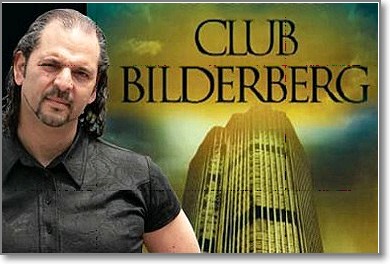
Because the conspiracy must go on, Ruskin had a null result in his latest conspiracy fishing expedition but he didn't let that stop him. For people with an ax to grind, a null result will never stop them. They can simply pivot and write up an inflammatory editorial about how it could have happened, go to a sympathetic editor at a friendly non-science journal and hand them a credit card, after which it will pass through breezy "editorial" review before appearing online.
Lacking any evidence, the article in Journal of Public Health Policy engages in what I call Inference By Helping Verb, where lack of evidence for claims doesn't matter because they only need to manufacture the veil of a conspiracy, in true trial lawyer fashion. That tactic is the reason U.S. Right To Know collaborates so often with trial lawyers.
"Might", "Could", Helping Verbs Make Any Systemic Conspiracy Theory Sound More Plausible
The authors of the editorial, all of whom have routinely suggested Science Is A Vast Corporate Conspiracy in the past (you can see this because their article has plenty of self citations and those of other people in their circle who allege such things often on Twitter) state that their interpretation of the legal fine print in a handful of nearly 100,000 documents means the soda giant could have suppressed studies it funded. In true conspiracy theory fashion, they even suggest the company probably did just that. Despite lacking any evidence that ever occurred, Ruskin and his friends engage in 'did you stop beating your wife?' framing and demand Coke stop doing the thing they did not do.
They use emotional verbiage they hope will substitute for facts. Example: They suggest Coke funded "the Global Energy Balance Network (GEBN) to divert attention from the role that sugar-sweetened beverages play in the obesity epidemic."
There are two inconvenient science facts these non-experts ignore.
First, sugar-sweetened beverages play no different role in the obesity epidemic than lettuce. Calories are calories and those are the only thing that matter, not how "sugary" the calories are.(1) In 100% of studies, people who consumed fewer calories than they burned have lost weight. Eating less is a diet guaranteed to work and it does not matter what the calories are. You should eat a balanced diet and get solid nutrition, but if you choose to do otherwise your weight gain won't be because the presence of some food magically made you fat, any more than eating too much quinoa will keep you healthy. (2)
Second, Coke did not turn any scholars from being against soda to being for it, they did not buy acceptance, the lead researcher they funded in the GEBN program had been saying the same thing for 30 years: that if you burn as many calories as you consume, you will not gain weight.
You know this is true if you understand how calories work but in their article U.S. Right To Know show why they are so successful at being deniers for hire; they will deny even the simplest tenet of biology to pursue their agenda. To do so, they cherry-pick other sources for their beliefs about what Coke did not do...like a blog which simply covered the news angle and didn't provide any evidence for a conspiracy.
And when they aren't linking to bloggers, they are linking to other political allies in their war on science, like discredited activist Paul Thacker and organic food advocate Marion Nestle.
But mostly their sources are blog posts from their friends or even their own industry funded trade group site all of which use the same Systemic Conspiracy Theory rhetoric.

Look, the credit card cleared so the Journal of Public Health Policy was not wrong for publishing it. If they hadn't done it, 50,000 other online outlets would have taken the money. Yay capitalism. And Ruskin was not wrong for paying to publish it. Thats his job, and it reads just like a trial lawyer's earnest plea for action, which is why companies pay him. But nothing in that journal piece contains science, so it is wrong for the authors and their press release writers to claim this is a "study." It is an editorial and nothing more.
But claiming this is a study is arguably the least deceptive thing they engage in.
How to know you're being emotionally manipulated, even in a "journal" article: Someone compares the company they're targeting to Big Tobacco
You probably see this kind of comparison all of the time, just as I do, and you certainly see it from activists. They will allege such and such did something and claim it is "right out of the Big Tobacco playbook." Ruskin and friends even do it in their press release: ""We are already hearing accusations from experts in nutrition that the food industry is copying tactics from big tobacco's playbook."
What? "Already' hearing accusations (9 years after the fact!) 'from experts in nutrition'? Who are these experts that Coke was suppressing? Why aren't those listed, with damning evidence of Coke insiders angered by an Inconvenient Truth and telling these wholesome independent whistleblowers they'll never work in this town again?
Because they don't exist. It's a fairy tale, written to get links from Mother Jones, ThinkProgress and the Guardian. It is drummed up emotional verbiage to make readers feel like there is something real in the article.
No industry is like Big Tobacco of the past today. Not even Big Tobacco. Anyone who uses that comparison is selling you something.
What FOIA giveth, FOIA can take away.
FOIA documents go both ways. While US Right To Know, Maharishi Institute, and their academic vassals in the New York University Arthur L. Carter Journalism Institute can suggest a Corporate Conspiracy, evidence shows it is actually on the anti-science side that everyone plays nicely and colludes to undermine academic scholarship.
In the science community, I can't get five people to agree on lunch. If I asked the #scicomm community to circle the wagons around something untrue they would invariably post it on Twitter and criticize me.
But on the denial side, I can predict in advance who will support an article claiming Coke has bought off scientists. The conspiracy is real, but it isn't happening in academic science or corporations, it is happening among trade groups and friendly websites and a tight-knit group of partisan non-science academics, at schools like UC San Francisco and NYU, collaborating with sympathetic journalists, and their allies like Naomi Oreskes, Marion Nestle, and a handful of others who have created brands claiming the same conspiracies about science.
Posted by the New York Times is this real exposé, not a sham versions like what has been done by Ruskin and his colleagues, showing collusion among activists, corporations, and journalists to promote misinformation and disinformation by someone they all know is an industry shill: economist Chuck Benbrook.
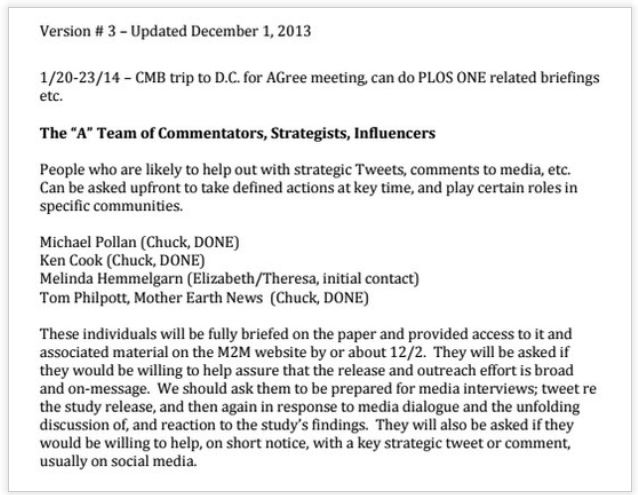
Using these influencers, claims by Benbrook that organic milk had better nutrition and organic food more antioxidants (using methodology like self-reported "mouth feel" among organic buyers surveyed) got lots of attention. Weirdly, after was exposed as being an industry plant who even lied about his job title, no one in this group criticized him. Nor did they criticize the senior author of that paper, who had nearly his entire catalog of work retracted after former grad students showed he made a lot of it up.
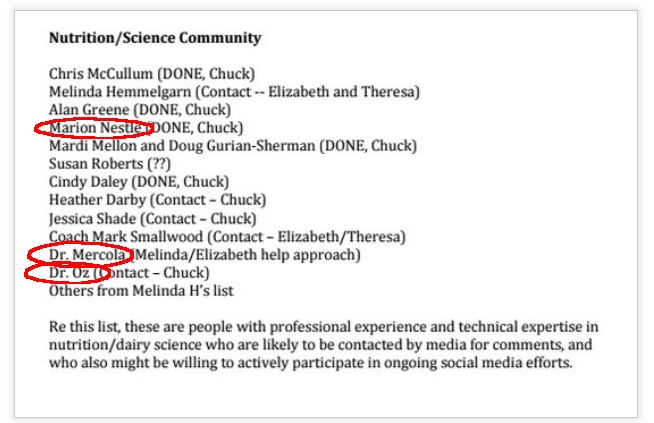
Poor Marion Nestle. Though she has a PhD, osteopath and supplement huckster Joe Mercola gets a Dr. title (he did not go to medical school) while Nestle does not. The environmental activism industry used to have the highest gender wage gap in America, women were very poorly paid compared to men, so it's no surprise in such sexist culture they call him Dr. Mercola and she is just Marion.
But she is not alone. Every shady epidemiologist, like Alex Lu and Phil Landrigan, are on email chains with Environmental Working Group, Friends of the Earth, Stonyfield Farms, Organic Valley, Center for Food Safety, and too many others to list.
When Landrigan and Benbrook wrote an article together about how much better organic food was for Gaia than science neither checked off the conflict of interest box discussing their funding from trade groups and corporations. The only thing Benbrook disclosed was humblebragging that he was on a USDA committee and served as expert witness for law firms.
Moxie Media, which represents Democrats in all their various forms (see below) gathered

everyone together to talk about how a Magic Soap seller - Dr. Bronner's products (no Bronner has been a doctor in anything) really do claim supernatural benefits - gave the latest campaign to block farmed salmon more money, arguably to motivate Consumer Reports, Stonyfield Organic, and the various activists and academics included to do more. Yes, in the activism community driving natural salmon to extinction is fine if it means more revenue for their $120 million soap company.

If I were an editor and they were on this list with DONE next to their names, you can bet I would be auditing their work to see if they were promoting his paper and staying "on message" the way emails say they would.
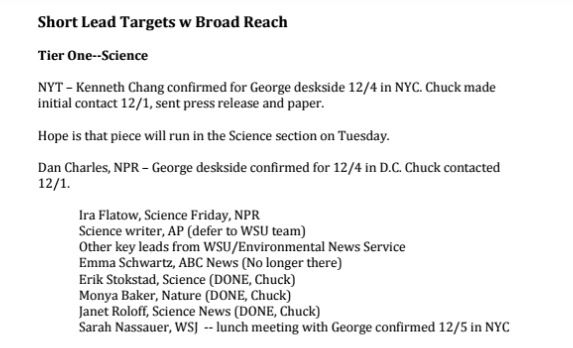
I could go on but there is no need. The New York Times published 80 pages of these FOIA documents. The point is there are not equivalent sets of documents with academics, journalists, environmental groups and industry leaders, all playing nicely. It is all on the anti-science side.
Lacking proof, activists have to cherry pick sentences from a few contracts and suggest a company could have suppressed research.
That's not even as close to undermining scholarship as what Ruskin and U.S. Right To Know do each day. But for their target audience, a helping verb is enough to claim guilt.
NOTES:
(1) Like claims about fat, which led to the fat-free craze (and which conspiracy theorists cited in the article began to claim was created by Big Sugar - I am not kidding), it is easy get a snowball of revenue rolling, and once that happens it is easy to find an academic who will support it. There was no real evidence resveratrol did anything for anyone, for example, but plenty of academics jumped on the 'red wine is good for you' bandwagon and published studies making inference claims about mice. Likewise after a quasi-diet book using 12 people (I am not kidding here either) to claim gluten was bad for people, there were plenty of academics who rushed to claim it led to Grain Brain and Wheat Belly. Bleached white table sugar was even defended by academics for a while when 10 years ago the fad against high fructose corn syrup took off.
(2) That was a well-publicized fad also, right after acai berries, which was right after chocolate was a health food craze.




Comments